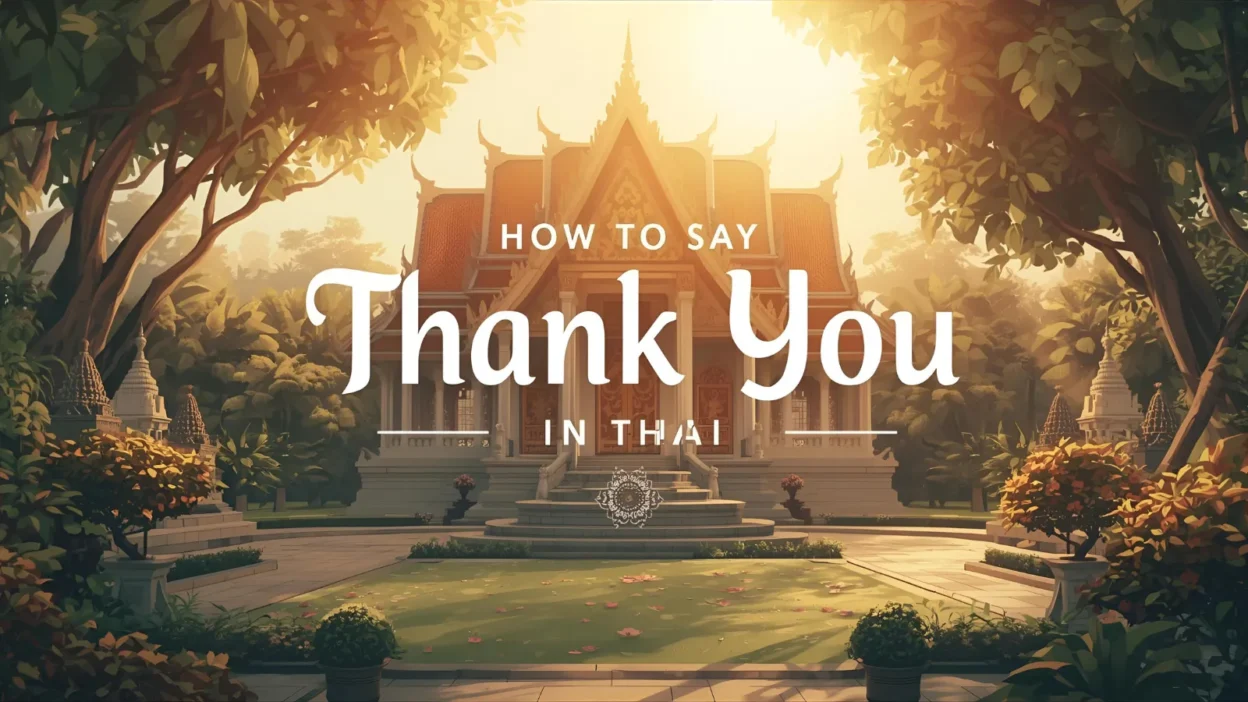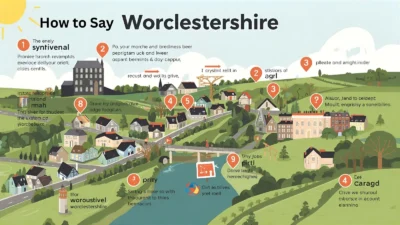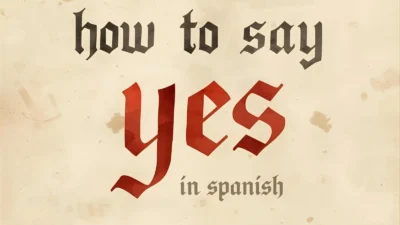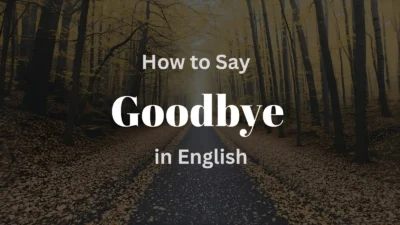Learning how to say thank you in Thai is a simple way to show kindness and respect when speaking to Thai people. The most common way to say thank you is “Khob khun” (ขอบคุณ). To sound polite, men add “khrap” (ครับ) and women add “kha” (ค่ะ) at the end.
Using these words will help you sound friendly, respectful, and appreciated wherever you go in Thailand. It’s a small phrase, but it carries a lot of meaning in Thai culture. Knowing how to say it correctly shows good manners and helps you connect better with locals.
Say Thank You in Thai
Ready to go beyond just “khop khun”? Here are 15 different ways to say “thank you” in Thai—with real dialogue and cultural context for each!
🙏 15 Ways to Say Thank You in Thai
| No. | Thai Phrase | English Meaning | Usage / Context |
|---|---|---|---|
| 1 | ขอบคุณ (khop khun) | Thank you | Standard, polite |
| 2 | ขอบคุณครับ (khop khun khrap) | Thank you (male speaker) | Polite for men |
| 3 | ขอบคุณค่ะ (khop khun kha) | Thank you (female speaker) | Polite for women |
| 4 | ขอบใจ (khop jai) | Thanks | Informal, casual with friends |
| 5 | ขอบใจนะ (khop jai na) | Thanks (friendly tone) | Soft, friendly way |
| 6 | ขอบคุณมาก (khop khun mak) | Thank you very much | More emphatic |
| 7 | ขอบคุณมากครับ (…khrap) | Thank you very much (male) | Polite and formal |
| 8 | ขอบคุณมากค่ะ (…kha) | Thank you very much (female) | Polite and formal |
| 9 | ซาบซึ้งใจ (saap seung jai) | Deeply grateful | Very heartfelt |
| 10 | ขอบคุณจริงๆ (khop khun jing jing) | Thank you so much | Stronger emphasis |
| 11 | ขอบคุณจากใจ (khop khun jak jai) | Thanks from the heart | Emotional, heartfelt |
| 12 | เป็นพระคุณอย่างสูง (pen phra khun yang suung) | Deep gratitude | Very formal, respectful |
| 13 | ขอบพระคุณ (khop phra khun) | Grateful thanks | Formal, often in writing/speeches |
| 14 | ขอบคุณนะครับ (khop khun na khrap) | Thanks (soft, male) | Polite with warmth |
| 15 | ขอบคุณนะคะ (khop khun na kha) | Thanks (soft, female) | Polite with warmth |
1. ขอบคุณ (khop khun) – Thank you
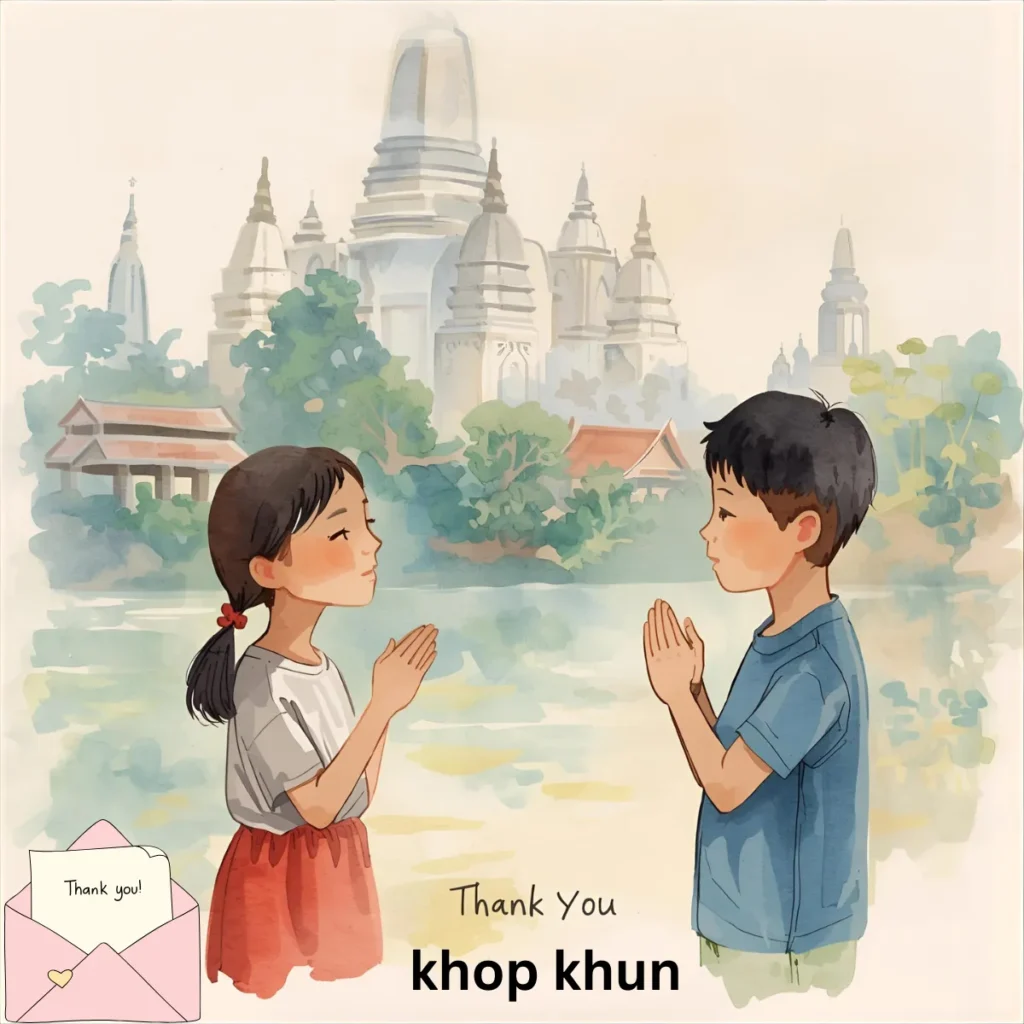
Origin:
The most basic and universal way to say thank you. “Khop” means “to thank” and “khun” means “you.”
Example:
👤 User A: นี่ของคุณครับ (This is for you.)
👤 User B: ขอบคุณครับ (Thank you.)
Use: Neutral and polite; suitable for most situations.
2. ขอบคุณครับ / ค่ะ (khop khun khráp / khâ) – Thank you (with polite particles)
Origin:
Thai uses gendered polite particles. Men say khráp (ครับ) and women say khâ (ค่ะ) to sound respectful.
Example:
👤 User A: ฉันเอาน้ำมาให้ค่ะ (I brought you some water.)
👤 User B: ขอบคุณครับ (Thank you.)
Use: Always use this for polite/formal situations.
3. ขอบใจ (khop jai) – Thanks (informal)

Origin:
A casual way to say thanks. “Jai” means “heart” — so it implies heartfelt thanks among close friends or younger people.
Example:
👤 User A: ฉันซื้อของว่างมาให้ (I brought snacks.)
👤 User B: ขอบใจนะ! (Thanks!)
Use: Informal; used with close friends or juniors.
4. ขอบพระคุณ (khop phra khun) – Deepest thanks
Origin:
An ultra-respectful form often used in speeches or to show deep respect. “Phra” is a prefix used for sacred or revered things.
Example:
👤 User A: ผมขอมอบทุนการศึกษาให้ครับ (I’m offering you a scholarship.)
👤 User B: ขอบพระคุณเป็นอย่างสูงค่ะ (Thank you very much.)
Use: Formal or official use, such as public speeches or business letters.
5. ซึ้งใจมาก (sʉ́ng jai mâak) – I’m very touched

Origin:
“ซึ้งใจ” means to be emotionally moved. This phrase shows sincere emotional gratitude.
Example:
👤 User A: ฉันอยู่กับคุณตอนคุณไม่สบาย (I stayed with you when you were sick.)
👤 User B: ซึ้งใจมากจริงๆ (I’m truly touched.)
Use: Emotional, heartfelt situations.
6. เป็นพระคุณอย่างยิ่ง (bpen phrá khun yàang yîng) – It’s a great kindness
Origin:
A poetic and extremely respectful way to thank someone, often used in writing or ceremonies.
Example:
👤 User A: ผมจะช่วยสนับสนุนโปรเจกต์ของคุณ (I’ll support your project.)
👤 User B: เป็นพระคุณอย่างยิ่งครับ (It is a great kindness.)
Use: Formal, respectful, usually written.
7. กราบขอบพระคุณ (gràap khop phrá khun) – I humbly thank you
Origin:
This phrase includes “กราบ” (gràap), meaning to prostrate or bow low, a gesture of utmost humility in Thai culture.
Example:
👤 User A: ผมช่วยชีวิตลูกคุณไว้ได้ (I saved your child’s life.)
👤 User B: กราบขอบพระคุณจริงๆค่ะ (I humbly thank you.)
Use: Rare, deeply respectful, for life-changing or sacred help.
8. ขอบคุณมาก (khop khun mâak) – Thank you very much
Origin:
Simply adds “มาก” (mâak), meaning “very,” to intensify the gratitude.
Example:
👤 User A: ฉันทำรายงานให้เสร็จแล้ว (I finished the report.)
👤 User B: ขอบคุณมากเลย! (Thanks a lot!)
Use: Friendly and emphatic.
9. ขอบคุณจริงๆ (khop khun jing jing) – Really, thank you
Origin:
“จริงๆ” (jing jing) means “truly” or “really.” Doubles the sincerity of the gratitude.
Example:
👤 User A: ฉันปล่อยให้คุณใช้รถฉันวันนี้ (You can use my car today.)
👤 User B: ขอบคุณจริงๆนะ (Thank you so much, really.)
Use: Honest and from-the-heart.
10. ขอบคุณนะ (khop khun ná) – Thanks (friendly tone)
Origin:
Adding “นะ” (ná) softens the sentence, making it sound gentle or affectionate.
Example:
👤 User A: ฉันซื้อน้ำให้แล้วนะ (I bought water for you.)
👤 User B: ขอบคุณนะ! (Thanks!)
Use: Friendly, sweet tone, especially between couples or close friends.
11. ขอบใจมากนะ (khop jai mâak ná) – Thanks a lot (casual)
Origin:
A blend of informal “khop jai” with extra warmth (“mâak” + “ná”).
Example:
👤 User A: ฉันช่วยล้างจานให้แล้ว (I did the dishes.)
👤 User B: ขอบใจมากนะ! (Thanks so much!)
Use: Very casual and friendly.
12. ขอบคุณสำหรับ… (khop khun sǎm-ràp…) – Thank you for…
Origin:
This structure lets you be specific about what you’re thankful for.
Example:
👤 User A: ฉันให้หนังสือคุณไปแล้ว (I gave you the book.)
👤 User B: ขอบคุณสำหรับหนังสือนะ (Thanks for the book.)
Use: Polite and clear; good for learners.
13. ขอบคุณล่วงหน้า (khop khun lûang nâa) – Thanks in advance
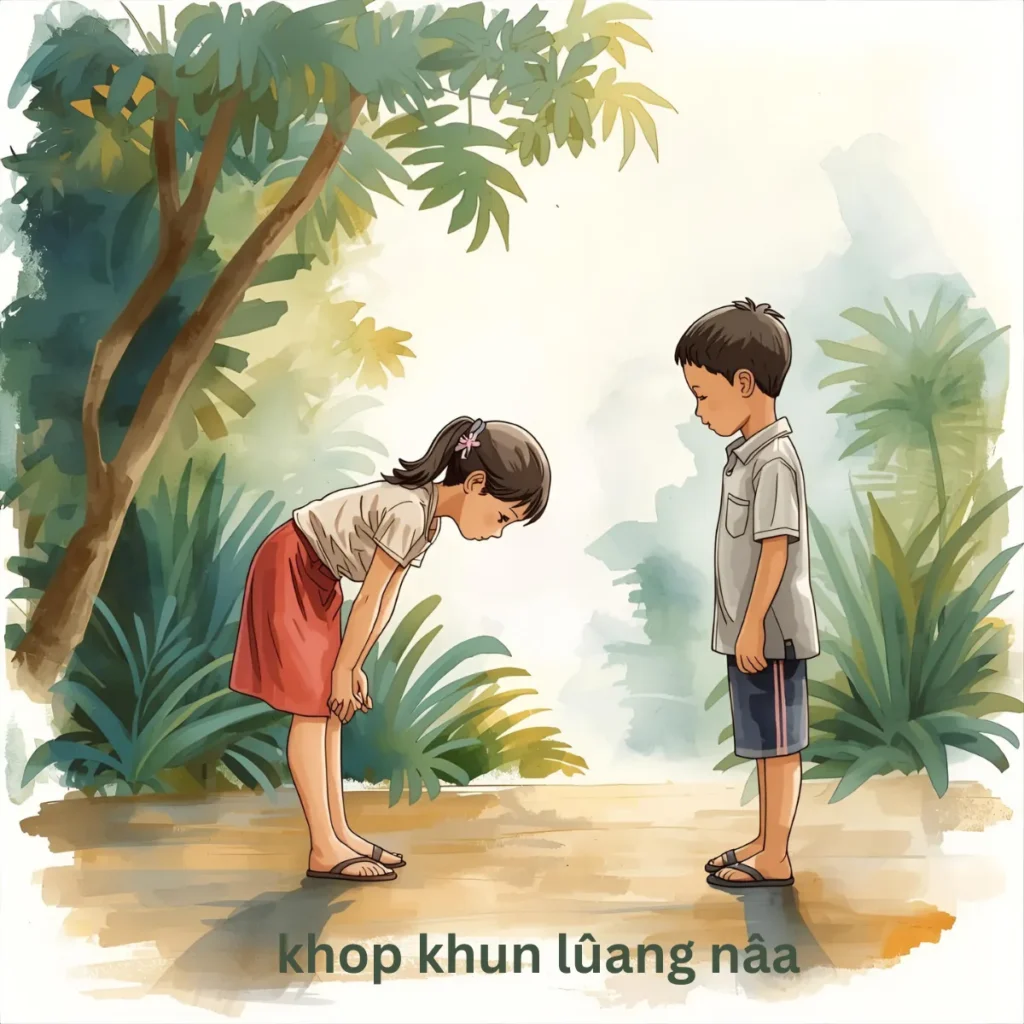
Origin:
Used when thanking someone ahead of time for something they will do.
Example:
👤 User A: ช่วยส่งรายงานให้ด้วยนะ (Please send the report.)
👤 User B: ขอบคุณล่วงหน้านะ (Thanks in advance.)
Use: Semi-formal, useful for messages and emails.
14. เป็นหนี้บุญคุณ (bpen nîi bun khun) – I’m in your debt
Origin:
A very Thai expression. “หนี้” means “debt” and “บุญคุณ” means “grace/kindness” — implies deep, lifelong gratitude.
Example:
👤 User A: ผมดูแลพ่อแม่คุณตอนป่วย (I cared for your parents while they were sick.)
👤 User B: ผมเป็นหนี้บุญคุณคุณจริงๆ (I’m truly in your debt.)
Use: Very formal and deep; often used in storytelling or emotional thanks.
15. ขอบคุณนะคะ / นะครับ (khop khun ná khâ / ná khráp) – Thanks with politeness and warmth
Origin:
Combines “ná” (gentle) and the gendered polite particle for maximum respect and friendliness.
Example:
👤 User A: เดี๋ยวฉันจะช่วยคุณจัดงานนะ (I’ll help organize the event.)
👤 User B: ขอบคุณนะคะ! (Thank you so much!)
Use: Very polite and warm; widely used in speech.
FAQs
1. What is the most common way to say thank you in Thai?
The most common way is “Khob khun” (ขอบคุณ), which means “thank you.”
2. How do you pronounce “Khob khun”?
It’s pronounced like “kob koon.”
3. How do men and women say thank you politely in Thai?
Men say “Khob khun khrap” (ขอบคุณครับ) and women say “Khob khun kha” (ขอบคุณค่ะ).
4. Is it important to add “khrap” or “kha”?
Yes, adding “khrap” (for men) or “kha” (for women) makes your thank you polite and respectful.
5. How do you say thank you very much in Thai?
You can say “Khob khun mak” (ขอบคุณมาก) — “mak” means “very much.”
6. How do you reply to thank you in Thai?
You can say “Mai pen rai” (ไม่เป็นไร), which means “you’re welcome” or “no problem.”
7. Is there a casual way to say thanks to friends?
Yes! You can say just “Khob khun” without “khrap” or “kha” when talking to close friends.
8. What’s the formal way to say thank you in Thai?
Use “Khob khun mak khrap/kha” to sound more polite and respectful.
9. Do Thai people use gestures when saying thank you?
Yes, they often use the “wai” gesture — placing hands together and bowing slightly while saying thank you.
10. Can tourists use “Khob khun khrap/kha” safely anywhere?
Absolutely! Thai people appreciate it when foreigners use polite phrases like “Khob khun khrap” or “Khob khun kha.”
Conclusion:
Knowing how to say thank you in Thai helps you connect with locals in a warm and respectful way. From casual thanks with khop khun to more formal or heartfelt expressions, these phrases show gratitude and respect in any situation. Using the right form will not only make you sound polite but also leave a positive impression on native speakers.
